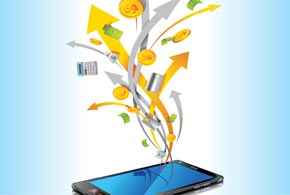As organizations across a wide swath of industries dip further into the mobile revolution, there’s a growing need to develop robust apps that provide broader and deeper functionality. At Emory University, a leading research university with more than 25,000 employees and 15,000 students, the concept is more than academic.
“There is a need to manage data and information in more sophisticated ways and connect people to it efficiently,” says Stephen Wheat, chief IT architect for the Atlanta-based school.
The mobile initiative began to take shape about three years ago. “We began looking at how the computing landscape was changing and some of the emerging challenges for getting the right information into user’s hands at the best possible place and moment,” Wheat explains, “and it was clear that mobility was at the center of things.”
Consequently, Emory University began investing in infrastructure upgrades to support mobility, while also laying out a process framework for building, reviewing and distributing mobile apps.
There were a few major drivers. “On the research side, there isn’t a better modality for gathering and distributing data than the mobile environment,” Wheat says. “The device that just about everyone is guaranteed to have available at any given moment is their smartphone.”
As a result, Emory has rolled out a collection of mobile apps and tools that are redefining everything from research and medicine to school services and human resources. The apps—the school currently offers about 20—are a key part of an overall strategy that focuses on digital information delivery and a more efficient and cost-effective IT infrastructure.
The university turned to Apperian, a provider of mobile app development and management tools, to support the mobile apps and IT infrastructure. For example, Emory now provides surgeons at the Grady Memorial Hospital trauma center with a clinical mobile app that helps them understand whether a massive transfusion is necessary and identify patients that would benefit from it.
Other clinical apps deliver best practices for surgeons, educational materials for doctors and patients, and post-transplant and procedure practices for perioperative cleaning and hygiene. Other medical apps cover everything from anatomy to general welfare, such as tracking seizures, sleep patterns, stress levels, suicide prevention and compliance with medicine.
The university uses the Apperian catalog to manage and distribute the apps, which are typically available on the Apple iOS and Android mobile platforms.
Increasingly, Emory University is making apps and functionality available via iPads, which fills an entirely different set of niche requirements in medical facilities and elsewhere. More general apps address everything from library resources to student news and events.
One challenge, Wheat says, has been building essential security and privacy protections, including HIPAA (the Health Insurance Portability and Accountability Act) mandates, in an increasingly BYOD (bring your own device) world. That has meant using encryption and specialized data storage tools.
Another challenge has revolved around the speed at which mobility is advancing. “For every app we build, there are probably four or five others we could produce, but there are limits on our budget and practical realities to building and introducing apps,” Wheat explains. The school currently has about 14 new apps in the pipeline.
“We’re introducing more and more apps to address a growing array of tasks and challenges,” Wheat reports. “We’re attempting to put information into people’s hands when and where they can use it most effectively.”










